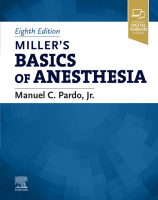Physical Address
304 North Cardinal St.
Dorchester Center, MA 02124

Patient positioning in the operating room facilitates surgical procedures; however, positioning can be a source of patient injury and can alter intraoperative physiology. Positioning injuries during surgery remain a significant source of perioperative morbidity. Anesthesia providers share a critical responsibility…

INTRODUCTION The Role of Regional Anesthesia Peripheral nerve blocks can provide surgical anesthesia and postoperative pain relief ( Table 18.1 ). The main emphasis of this chapter will be on ultrasound guidance for peripheral nerve blocks. However, paresthetic-based techniques and…

PRINCIPLES Spinal, epidural, and caudal blocks are collectively referred to as central neuraxial blocks . Significant procedural, physiological, and pharmacological differences exist between the techniques, but all blocks result in some combination of sympathetic, sensory, and motor blockade. Spinal anesthesia…

Expertise in airway management is the cornerstone of safe anesthesia practice. The past decades have seen an evolution of airway management, notably with the adoption of supraglottic airway (SGA) devices in the early 1990s and, more recently, the rapid uptake…

THE ANESTHESIA WORKSTATION In the decades after the first public demonstration of ether anesthesia in 1846 the anesthesia delivery system consisted of handheld devices ranging from ether- or chloroform-soaked cloths to more sophisticated inhalers that could regulate the administered dose…

The decision-making process regarding anesthetic technique begins with the proposed surgical procedure and incorporates the patient's coexisting diseases and preferences for care. The ultimate responsibility for anesthetic choice lies with the anesthesia provider. Once the anesthesia type is selected, additional…

High-quality anesthesia care begins with the preoperative evaluation. The goals of preoperative evaluation include understanding the proposed surgery, assessing the risk of coexisting medical conditions, deciding whether additional testing is needed to prepare the patient for the procedure, discussing options…

~~ A major concern within the specialty of anesthesiology is the impact of general anesthesia and sedative drugs on neurodevelopment and cognition across the life span. Although definitive conclusions cannot be made, anesthesia providers should follow the progress of our…

INTRODUCTION Neuromuscular blocking agents (NMBAs) interrupt the usual transmission of nerve impulses at the neuromuscular junction (NMJ) by one of two mechanisms to interfere with neuromuscular transmission and produce paralysis of skeletal muscles. On the basis of differences in their…

Local anesthesia can be defined as loss of sensation in a discrete region of the body caused by disruption of nerve impulse generation or propagation. Local anesthesia can be produced by various chemical and physical means. However, in routine clinical…